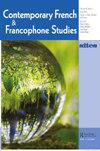Speaking Out: Intersectional Denunciations of Sexual Assault and Police Responses in Michaela Coel’s I May Destroy You and Édouard Louis’ Histoire de la violence
IF 0.2
4区 文学
0 LITERATURE, ROMANCE
引用次数: 0
Abstract
Increasingly diverse Western European societies have developed their own conversations around intersectionality that focus on local issues. Two artists and public intellectuals that demonstrate this increasing level of engagement with intersectionality in Western Europe are writer and actress Michaela Coel and writer Édouard Louis, from England and France, respectively. In the 2020 TV series I May Destroy You, Coel presents the story of a working-class English black writer named Arabella who has been sexually assaulted. She also gives the spotlight to Arabella’s best friend, Kwame, a black gay man who has also been assaulted but whose experience differs greatly from Arabella due to his gender and sexual orientation. I May Destroy You introduces its viewers to intersectionality by insisting on how Arabella and Kwame’s specific identities lead to different outcomes. Likewise, French writer Édouard Louis’s 2018 novel Histoire de la violence revolves around the author’s rape by a man of North African descent in order to examine the treatment of queer people and ethnic minorities by the police and French society at large. Both creators have succeeded in making their audiences aware of how intersectionality is a necessary tool to comprehend systemic inequality in their respective countries.大声疾呼:Michaela Coel的《I May Destroy You》和Édouard Louis的《Histoire de la violence》中对性侵犯的交叉谴责和警察的反应
日益多样化的西欧社会已经形成了他们自己的关于交叉性的对话,重点关注当地问题。两位艺术家和公共知识分子分别来自英国和法国的作家兼演员Michaela Coel和作家Édouard Louis,他们证明了西欧与交叉性的接触程度越来越高。在2020年的电视剧《我可能摧毁你》(I May Destroy You)中,科尔讲述了一位名叫阿拉贝拉(Arabella)的工薪阶层英国黑人作家遭到性侵犯的故事。她还把焦点放在了阿拉贝拉最好的朋友夸梅身上,夸梅是一个黑人同性恋,他也遭到了袭击,但由于他的性别和性取向,他的经历与阿拉贝拉大不相同。《我可以摧毁你》通过强调阿拉贝拉和夸梅的特定身份如何导致不同的结果,向观众介绍了交叉性。同样,法国作家Édouard路易斯(Édouard Louis) 2018年的小说《暴力史》(Histoire de la violence)围绕作者被一名北非裔男子强奸的故事展开,以审视警察和整个法国社会对酷儿和少数民族的待遇。两位创作者都成功地让观众意识到,交叉性是理解各自国家系统性不平等的必要工具。
本文章由计算机程序翻译,如有差异,请以英文原文为准。
求助全文
约1分钟内获得全文
求助全文
来源期刊

Contemporary French and Francophone Studies
LITERATURE, ROMANCE-
CiteScore
0.30
自引率
0.00%
发文量
43
期刊介绍:
An established journal of reference inviting all critical approaches on the latest debates and issues in the field, Contemporary French & Francophone Studies (formerly known as SITES) provides a forum not only for academics, but for novelists, poets, artists, journalists, and filmmakers as well. In addition to its focus on French and Francophone studies, one of the journal"s primary objectives is to reflect the interdisciplinary direction taken by the field and by the humanities and the arts in general. CF&FS is published five times per year, with four issues devoted to particular themes, and a fifth issue, “The Open Issue” welcoming non-thematic contributions.
 求助内容:
求助内容: 应助结果提醒方式:
应助结果提醒方式:


